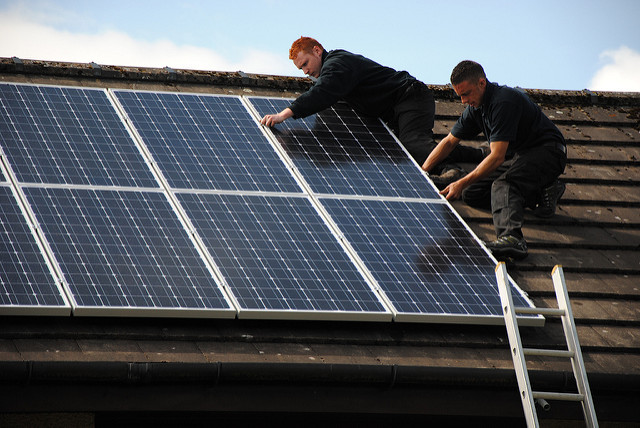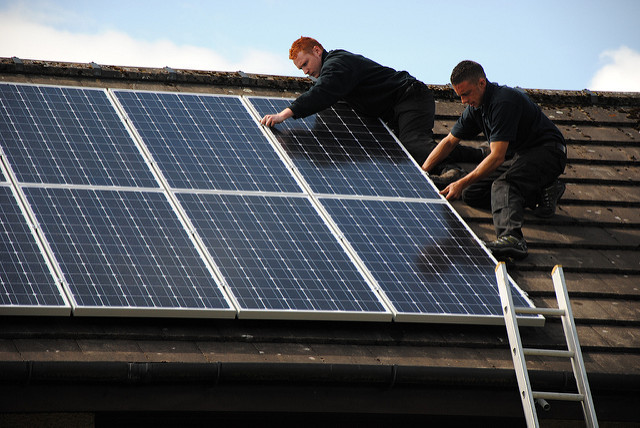
Harnessing renewable sources of energy has always been a popular idea on a commercial level, but the good news is that it is slowly becoming a viable option at an individual level too. You can install a solar panel on your roof and take the advantage of solar energy, thus reducing your dependence on an electrical system or power grids. If you are planning on installing solar panels on your roof, keep the following points in mind.
1. Determine if Solar Panels Would Benefit your House
Before you even begin the process of choosing and installing solar panels, you must determine if it is indeed beneficial for your house to have a solar panel installation. Analyze the requirements and parameters before you install anything. If the required parameters are not met, it would defeat the purpose of installing the solar panels.
Consider your roof structure, its direction and the kind of shade it receives throughout the year. If your roof receives a good amount of direct sunlight for the most part of the year, it would be a good idea of install solar panels. If you have huge trees surrounding your roof, there will be a lot of shade, thus preventing the panels from harnessing solar energy even if there is good sunlight throughout the day. Make sure that panels are placed in a manner that they do not accumulate any debris that would obstruct the panels from receiving proper sunlight.
2. Determine the Consumption Rate
A quick study of your energy bills will help you determine how much electricity you consume. If the consumption is less, a small solar system would suffice and vice versa. Monitor your electrical consumption carefully and set the solar harnessing plan accordingly.
An average solar cell approximately provides 0.5 volts and an entire solar panel generally consists of 36 - 72 solar cells. Estimate the number of panels you would need to meet your total electricity consumption per day, month or year.
3. Types of Solar Panel
Two dominant solar technologies available in the market are
a) Photovoltaic - Uses arrays of cells to convert sunlight into electricity
b) Thermal - Uses sunlight to heat air or water for use
Based on whether you need to generate electricity or need to heat water or air, you can choose either of the solar technologies.
Next comes choosing the solar panels, which are mainly categorized into two types-
• Mono crystalline which has a blackish tinge
• Poly crystalline which has an overall bluish hue, with the shades of blue differing from cell to cell.
Examine each option carefully and measure solar panel’s efficiency to determine which solar panel would benefit you.
4. Warranty Details
Generally, solar panels can last up to 25 years under ordinary circumstances. Make sure you purchase from a reputed supplier as you can be guaranteed of long lasting performance without too many problems down the road.
Go for a solar set-up which is secured under a warranty period. Don’t forget to ask for a warranty certificate so that you can be assured of being insured in case there is any kind of malfunction or issue with the solar panels.
5. Cost of the Setup
Determine how much it would cost you to purchase and install the entire solar set up. The more powerful the panel is, the more expensive it would be per panel, however, they may prove to be cheaper overall if you consider the installation and output that they would produce. Solar panels help in reducing your dependency on electricity from the power grid, which helps in saving money in the long run. Set aside a budget, request your suppliers to outline all the possible options for you and get several quotes from various companies so that you can have a better understanding of all the available options.
Choose the solar panel that is best suited for your home instead of opting for the popular ones. Look at various options before finalizing one.
Author Bio: Jeson Pitt works with the marketing department of D&F Liquidators and regularly writes to share his knowledge while enlightening people about electrical products and solving their electrical dilemmas. He's got the industry insights that you can count on along with years of experience in the field. Jeson lives in Hayward, CA and loves to explore different cuisines that the food trucks in the Bay area have to offer.
Image Source: https://evergreensolar.com



